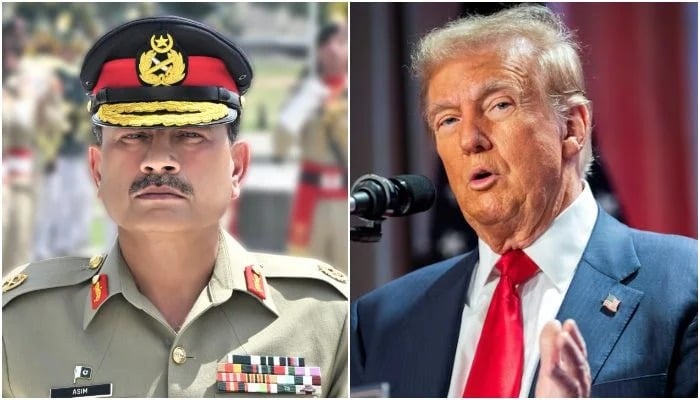The regional stabiliser
The Trump-Munir meeting, in essence, was a strategic message to the world: Pakistan is essential, relevant and unignorable
June 25, 2025

In a geopolitical moment as symbolic as it is strategic, the meeting between COAS Field Marshal Asim Munir and US President Donald Trump marks an extraordinary and unprecedented shift in the regional and global calculus.
The meeting didn’t just occur in a vacuum of diplomacy; it sent shockwaves across continents, challenging long-held narratives and exposing stark contrasts in leadership, regional influence, and diplomatic credibility. What made the moment historic was the unambiguous recognition by a global political heavyweight of Pakistan’s role as a dependable stabilising force in South Asia.
In an era where shifting alliances dictate global strategy, Pakistan’s outreach, simultaneously admired by Iran, respected by China and embraced by the US, places it in a uniquely powerful and balanced position, standing tall in contrast to a visibly isolated India. Trump’s vocal admiration, paired with Pakistan’s dignified restraint and growing global outreach, dismantles years of hostile propaganda aimed at portraying the country as anything but the anchor of regional equilibrium.
The endorsement of Pakistan’s leadership by Trump, particularly referring to meeting COAS Gen Asim Munir as a privilege, is a diplomatic blow to India’s decades-long attempts to isolate Islamabad on the global stage. Pakistan’s ability to simultaneously build trust with conflicting regional players such as Iran and the US speaks volumes about its foreign policy finesse.
Where Tehran echoes “Tashakur Pakistan” for its role in calming tensions and supporting regional peace, and Washington opens diplomatic doors for strategic engagement, Pakistan emerges as an indispensable pivot in the volatile matrix of Middle Eastern and South Asian politics.
In sharp contrast, India’s aggressive militarism, overzealous propaganda and autocratic posture have earned it global fatigue. No longer viewed as the world's democratic darling, New Delhi is increasingly recognised for its unilateralism, internal human rights violations and regional belligerence; a reputation it can no longer ignore.
In the aftermath of the decisive events branded as ‘Marka-e-Haq’, Pakistan’s global stature has surged, while India’s image has collapsed under the weight of its own arrogance. This turning point, defined by Pakistan’s strategic clarity, military preparedness and diplomatic composure, reshaped how the world sees South Asia. India’s war hysteria and anti-Pakistan obsession were met not with panic but with poise and tactical superiority.
The fallout was predictable: India was left red-faced in front of the international community, its narrative dismantled and its credibility shredded. On the other hand, Pakistan demonstrated not only strategic restraint but also mastery in hybrid diplomacy, conveying both the will for peace and the capacity for a decisive response.
The COAS’s leadership style, combining operational wisdom with diplomatic subtlety, has become the cornerstone of this shift. Trump’s words articulated a new global recognition that Pakistan, far from being an isolated state, is a linchpin for peace, security and balance in South Asia.
The old and failed attempts to de-hyphenate Pakistan and India, driven primarily by Indian lobbying and Western strategic myopia, now seem laughably obsolete. Pakistan has returned to the core of every regional discussion and compelled even reluctant global actors to acknowledge the India-Pakistan equation as one that cannot be artificially disentangled.
The Trump-Munir meeting, in essence, was a strategic message to the world: Pakistan is essential, relevant and unignorable. India’s military, diplomatic, and informational misadventures have only backfired, exposing its fragile strategic depth.
Whether it was the attempt to internationalise Baloch separatism, manufacture false flag operations or use disinformation to tarnish Pakistan’s image, the reality remains that New Delhi’s tactics have pushed it into self-created isolation.
Meanwhile, Pakistan has outmanoeuvred these provocations by building broader coalitions of goodwill from Beijing to Riyadh, Tehran to Washington.
One of the most significant outcomes of this geopolitical thaw is the rekindled global attention on the Kashmir dispute, a conflict long buried under the weight of strategic apathy and Indian censorship. Trump’s willingness to acknowledge the issue and his stated desire to “play a role” in resolving it is a major diplomatic victory for Pakistan.
More importantly, it is also a direct reflection of the leadership style of individuals like COAS Field Marshal Asim Munir, who have shown the world that strength lies not in loud declarations, but principled consistency.
The warmth of one superpower does not guarantee clarity on all fronts. In fact, managing expectations, especially in matters as sensitive as Kashmir or the Indus Waters Treaty, will be Pakistan’s real challenge, particularly as India continues to lobby hard to deflect international attention.
Pakistan seems aware of the stakes, though this balancing game comes with pressure. What lies ahead is a test of how long this equilibrium can be maintained, especially as the regional order continues to evolve. But for now, one thing is clear: in this new global context, Pakistan is no longer defending its narrative; it is defining it.
The writer is a freelance contributor and writes on issues concerning national and regional security. She can be reached at: [email protected]
Disclaimer: The viewpoints expressed in this piece are the writer's own and don't necessarily reflect Geo.tv's editorial policy.
Originally published in The News











